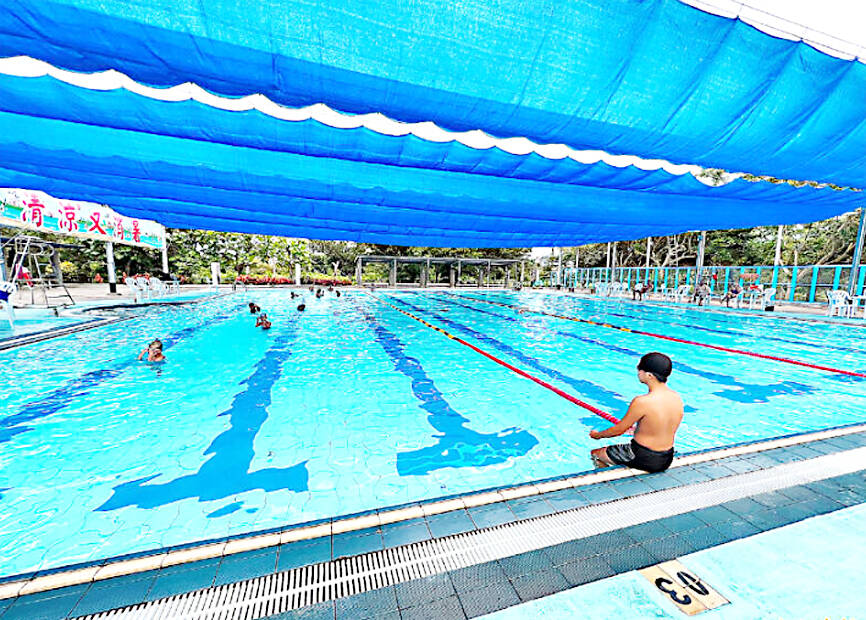Taiwan is having an acute shortage of lifeguards, due to unsatisfactory wages and legal worries, Control Yuan member Fan Sun-lu (范巽綠) said.
Lifeguard examination required for government certification by the Sports Administration which started in 2020, and the administration’s ban of all other tests by the private sector had a role in the shortage, Fan said in a report.
Experts and researchers said the government exam excludes the private sector and costs more, while the pass rate is lower, Fan said, adding that the standards are unrealistic.

Photo: Taipei Times file
The administration, which falls under the Ministry of Education, lacks well-updated data on the situation of lifeguards across the country, as it has conducted one survey targeting lifeguards since 2020, which received 337 responses, she said, adding that 70 percent of the respondents were active while 30 percent had already quit the job.
Lack of job stability, unsatisfactory salary, heavy workload, legal risks and starting another job due to the COVID-19 pandemic were among the reasons given by respondents who quit or have considered quitting, Fan said.
“Pool operators, those businesses needing to watch over swimmers at lakes and the seashore, in recent years had to rely mainly on young student groups who had just obtained certification, to fill the shortage,” she said.
“To deal with the shortage, swimming pool operators, and lake and beach administrations have to rely on young students who have just received their certificates,” she said.
Fan urged the Executive Yuan and the ministry to address the shortcomings and made recommendations.
A new standardized test should be developed for lifeguard certification, and the ministry should delegate the exam to the private sector and inspect those institutions instead of banning them from holding exams, Fan said.
Some developed countries such as the US, Japan, the UK and Australia have examples of private institutions testing lifeguard candidates, Fan said, adding that the Sports Administration’s application virtually turned it into a monopoly and led to the nation’s personnel shortage.
Referring to data showing the majority of deaths caused by drowning taking place at rivers, seas and other bodies of open water, Fan said that the government agency in 2018 standardized lifeguard certification solely based on swimming pool environments.
“The exam mainly focuses on swimming skills and physical capacity, while ignoring practical experience and the ability to quickly adapt to ever-changing factors in open water bodies. It clearly does not meet what a lifeguard’s work requires,” Fan said.
“The Executive Yuan must take action on the issue and coordinate government agencies to conduct a comprehensive review to come up with new regulations which should include improving work conditions, increasing salaries, clarifying legal responsibilities... and revising the certification process, while better protecting lifeguards’ rights to heal the sector and make it sustainable,” Fan said.

Chinese Nationalist Party (KMT) Chairman Eric Chu (朱立倫), spokeswoman Yang Chih-yu (楊智伃) and Legislator Hsieh Lung-chieh (謝龍介) would be summoned by police for questioning for leading an illegal assembly on Thursday evening last week, Minister of the Interior Liu Shyh-fang (劉世芳) said today. The three KMT officials led an assembly outside the Taipei City Prosecutors’ Office, a restricted area where public assembly is not allowed, protesting the questioning of several KMT staff and searches of KMT headquarters and offices in a recall petition forgery case. Chu, Yang and Hsieh are all suspected of contravening the Assembly and Parade Act (集會遊行法) by holding

PRAISE: Japanese visitor Takashi Kubota said the Taiwanese temple architecture images showcased in the AI Art Gallery were the most impressive displays he saw Taiwan does not have an official pavilion at the World Expo in Osaka, Japan, because of its diplomatic predicament, but the government-backed Tech World pavilion is drawing interest with its unique recreations of works by Taiwanese artists. The pavilion features an artificial intelligence (AI)-based art gallery showcasing works of famous Taiwanese artists from the Japanese colonial period using innovative technologies. Among its main simulated displays are Eastern gouache paintings by Chen Chin (陳進), Lin Yu-shan (林玉山) and Kuo Hsueh-hu (郭雪湖), who were the three young Taiwanese painters selected for the East Asian Painting exhibition in 1927. Gouache is a water-based

Taiwan would welcome the return of Honduras as a diplomatic ally if its next president decides to make such a move, Minister of Foreign Affairs Lin Chia-lung (林佳龍) said yesterday. “Of course, we would welcome Honduras if they want to restore diplomatic ties with Taiwan after their elections,” Lin said at a meeting of the legislature’s Foreign Affairs and National Defense Committee, when asked to comment on statements made by two of the three Honduran presidential candidates during the presidential campaign in the Central American country. Taiwan is paying close attention to the region as a whole in the wake of a

OFF-TARGET: More than 30,000 participants were expected to take part in the Games next month, but only 6,550 foreign and 19,400 Taiwanese athletes have registered Taipei city councilors yesterday blasted the organizers of next month’s World Masters Games over sudden timetable and venue changes, which they said have caused thousands of participants to back out of the international sporting event, among other organizational issues. They also cited visa delays and political interference by China as reasons many foreign athletes are requesting refunds for the event, to be held from May 17 to 30. Jointly organized by the Taipei and New Taipei City governments, the games have been rocked by numerous controversies since preparations began in 2020. Taipei City Councilor Lin Yen-feng (林延鳳) said yesterday that new measures by